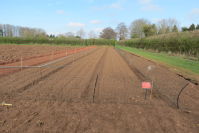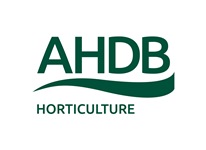All entries for April 2014
April 29, 2014
Wellesbourne pest update
Since Friday we have captured:
- 191 carrot flies on traps in the overwintered carrots (3 traps)
- 313 carrot flies on traps in newly-emerged carrots (3 traps)
In the 3 water traps:
- 66 male and 17 female cabbage root flies
- 309 bean seed flies
- 2 pollen beetles
- 1 flea beetle
We collected a total of 11 cabbage root fly eggs from around 15 cauliflower plants (planted 15 April).
We caught one diamond-back moth (2 pheromone traps)
We have pheromone traps out for European tarnished plant bug and common green capsid - and caught 4 European tarnished plant bugs.
April 25, 2014
Pest update
Since Tuesday we have captured:
- 112 carrot flies on traps in the overwintered carrots (3 traps)
- 37 carrot flies on traps in newly-emerged carrots (3 traps)
In the 3 water traps:
- 41 male and 14 female cabbage root flies
- 168 bean seed flies
- 7 pollen beetles
We collected a total of 7 cabbage root fly eggs from around 15 cauliflower plants (planted 15 April).
We caught one diamond-back moth (2 pheromone traps)
We have pheromone traps out for European tarnished plant bug and common green capsid - and caught nothing.
Rothamsted suction trap captures
The 3rd issue of AHDB Aphid News has just been released:ahdb_aphid_news_20140425.pdf
The numbers of early aphids in our suction-trap samples have not significantly increased during Bulletin Week 3: 14/4-20/4, but the spread across the country is widening.
- Four peach–potato aphids were caught this week (Preston, Broom’s Barn, Writtle and Wye). The first arrival at Preston was six weeks earlier and at Writtle two weeks earlier than the 10-year mean.
- Two potato aphids (Macrosiphum euphorbiae) were caught, including a first arrival at Hereford, three weeks earlier than the 10-year mean.
- This year’s first pea aphid (Acyrthosiphon pisum) was caught at Wye, a month earlier than the 10-year mean.
- No cabbage aphids (Brevicoryne brassicae), or willow carrot aphids (Cavariella aegopodii) were caught this week.
April 22, 2014
Trap captures at Wellesbourne today
Pest numbers have increased a bit since Friday.
Between Friday and Tuesday we caught:
- 40 carrot flies on traps in the overwintered carrots (3 traps)
- 7 carrot flies on traps in newly-emerged carrots (plot shown below) (3 traps)
In the 3 water traps:
- 1 male and 10 female cabbage root flies
- 24 bean seed flies
- 4 pollen beetles
- 3 flea beetles
We collected a total of 5 cabbage root fly eggs from around 15 cauliflower plants (planted 15 April).
We also put out pheromone traps for diamond-back moth, turnip moth, silver Y moth last week and nothing has been captured so far.
We have pheromone traps out for European tarnished plant bug and common green capsid - and caught a total of 12 European tarnished plant bugs (3 traps).
April 20, 2014
Update on trap captures at Wellesbourne
When the sticky traps at Wellesbourne were checked on Friday (18th) there were:
- 6 carrot flies on traps in the overwintered carrots (3 traps)
- 2 carrot flies on traps in newly-emerged carrots (3 traps)
In the 3 water traps there were:
- 2 male and 3 female cabbage root flies
- 8 bean seed flies
- 6 pollen beetles
- 3 flea beetles
April 17, 2014
Update on suction trap captures for week ending 13 April.
The most recent edition of AHDB Aphid News has just been published: ahdb_aphid_news_20140417.pdf
More aphids have been captured 'early':
-
Four peach–potato aphids were caught (Broom’s Barn 3 and Kirton 1). The first arrival at Broom’s Barn was over four weeks earlier than the 10-year mean.
-
A field report from eastern England identified a peach–potato aphid on a sugar beet crop at the cotyledon stage. Further field observations indicate aphids are flying, especially potato aphids.
-
Three potato aphids (Macrosiphum euphorbiae) were caught, including first arrivals at Rothamsted and Kirton, four to five weeks earlier than the ten year means.
-
The shallot aphid (Myzus ascalonicus) is the most numerous aphid species to date, with particular hotspots at Kirton and Wye.
-
No cabbage aphids (Brevicoryne brassicae), willow carrot aphids (Cavariella aegopodii) or pea aphids (Acyrthosiphon pisum) were caught his week.
April 15, 2014
Trap captures today
When the Wellesbourne traps were checked today there were:
- 5 carrot flies (3 traps)
and in the 3 water traps there were:
- 1 male and 1 female cabbage root fly
- 10 bean seed flies
- 4 pollen beetles
- 16 flea beetles
April 11, 2014
Trap counts on Friday 11th April
In the traps at Wellesbourne that were checked today we found:
- 6 carrot flies (3 traps)
and in 3 water traps:
- 6 male cabbage root flies
- 1 female cabbage root fly
- 11 bean seed flies
The first issue of the AHDB Aphid News ahdb_aphid_news_20140411.pdf has just been released:
The temperature in January and February was considerably higher than the long-term average throughout the country, by 1 to 1.5ºC in the north and around 2°C in the south, leading to expected first aphid flights of two to four weeks earlier than average. So far:
- Three peach–potato aphids (Myzus persicae) have been caught, three to eight weeks earlier than the 10-year mean, the individual at Kirton being particularly early.
- A single potato aphid (Macrosiphum euphorbiae) has been caught at Broom’s Barn almost seven weeks earlier than the 10-year mean.
- A single willow carrot aphid (Cavariella aegopodii) has been caught at Starcross near Exeter, over three weeks earlier than the 10-year mean.
- The shallot aphid (Myzus ascalonicus) is the most numerous aphid species in suction-trap samples to date.
- No cabbage aphids (Brevicoryne brassicae) or pea aphids (Acyrthosiphon pisum) have been caught so far this year.
April 09, 2014
Trap counts on Tuesday, 8th April
Yesterday in our 3 yellow water traps we captured:
- 14 male and 4 female cabbage root flies
- 22 bean seed flies
- 1 pollen beetle
We also caught 1 male carrot fly on our sticky traps (3).
April 05, 2014
Trap counts on Friday 4th April
Captures between 1st and 4th April were:
- 1 male carrot fly (3 sticky traps)
and from 3 yellow water traps:
- 3 male cabbage root fly
- 2 bean seed fly
- 10 pollen beetles
- 4 flea beetles
- 3 cabbage stem weevil
 Rosemary Collier
Rosemary Collier

 Please wait - comments are loading
Please wait - comments are loading

 Loading…
Loading…


